Family Health History: Why is it important?
Published 25 Nov 2020 • By Doriany Samair
Although predicting the occurrence of diseases is not yet a reality, it is now possible to explore the risks of developing an illness based on our family medical history.
But what is "family health history"? Why is it important to be aware of it? What do our genes tell us about our health? Which diseases are involved?
In an attempt to answer these questions, Carenity asked its members through a survey. The aim was to assess the extent to which patients take into account their family medical history and to find out what hinders the collection of this information.

Family Health History
What is it?
Health is often a family matter. We share much more than physical characteristics with our family members: way of life (eating habits and lifestyle), environment and genetics. All these elements put together expose us to common risk factors.
As part of a survey, Carenity asked its members about their family health history. 445 members took part in this survey after first indicating their diagnosed health conditions.
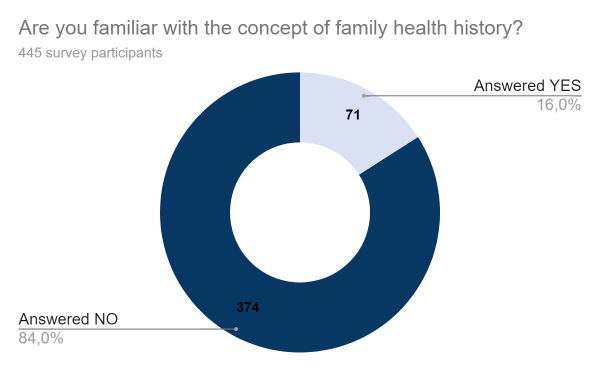
84% of respondents have not heard of the concept of family health history.
This concept seems to be little known but is actually a common topic of conversation. Ultimately, it is a matter of gathering medical information about one's family: "At what age did my great-grandfather die? Did my great aunt have breast cancer? Why did my mother's uncle die so young? Why does Granny monitor her sugar level? Why is my brother a haemophiliac and not me?"
These are subjects that can also be part of the routine questions during a doctor's examination. For example, to identify an individual's cardiovascular risk, the early death of a close relative (by heart attack or sudden death) is taken into account and is a risk factor.
How do we determine our family health history?
According to the Carenity survey, before diagnosis 53.9% of participants were aware of their family history.
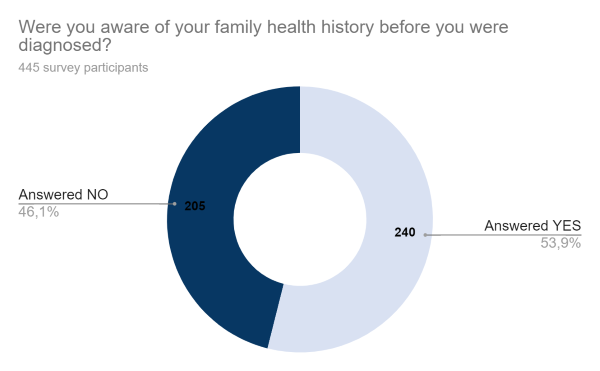
Who to include?
Identifying illnesses that tend to occur repeatedly in the same family over several generations is essentially the same as establishing family health history. It is a matter of identifying predispositions to certain illnesses existing within one's family.
To do this, it is necessary to gather medical information from one's close family, including members with whom one is directly related by blood: parents, grandparents and great-grandparents, brothers and sisters, nephews and nieces, uncles and aunts, children.
It is a good idea to approach these family members by explaining the approach and objectives of this information gathering (sharing within the family). Indeed, this is private information that sometimes requires face-to-face interviews.
What to include?
Some details may seem superfluous or even insignificant, yet there are some which should not be overlooked. To guide the interview: exploring the causes of death of family members and noting the age of death is a good way to start your research. In a more obvious way, it may be useful to make an exhaustive list of the major medical conditions of each member of the family (even if many of them, such as infectious diseases, do not involve hereditary transmission). Note the age of onset of these diseases. Age is an important clue to include: a disease may tend to occur in young people for example. It is possible to trace the ethnic origins of your lineage, as some ethnic groups share certain risk factors, for example sickle cell disease is more common in populations originating from the Mediterranean basin or Africa. It is therefore essential not to forget to mention cancers, pregnancies which have not reached full term and miscarriages, non-congenital malformations, family allergies or any other recurring pathology in the family.
The idea is to gather relevant medical information in order to determine which diseases our family environment exposes us to. It must be kept in mind that these predispositions put us at a greater risk of developing a particular condition than others, but having relatives with a medical condition does not mean that you will definitely develop that condition.
Why is it important to be aware of one's family health history? Which conditions are involved? What are the obstacles to compiling one's family health history?
Why is it important to be aware of family health history and which conditions are important?
As part of our survey, we asked our members for their views on the importance they place on their medical history.
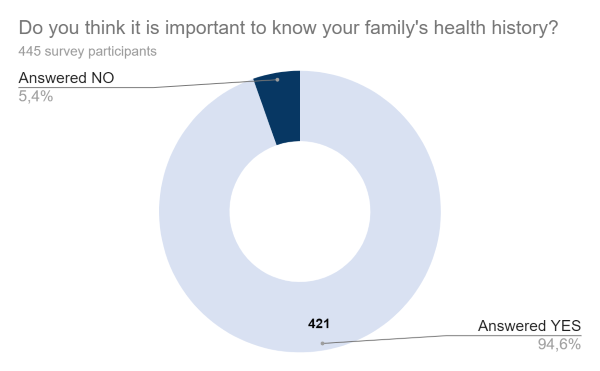
There are many cases where our family's medical history can tell us a lot about our own health. Sometimes it is useful to know your family's medical history in order to identify the people most at risk of developing a health condition.
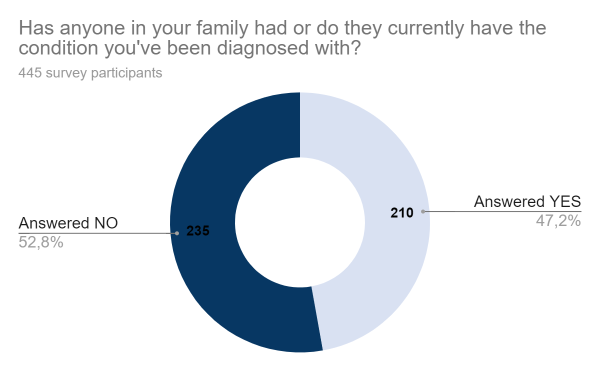
Almost half of the survey participants revealed that they had a family member with the same illness.
Furthermore, certain chronic conditions such as heart disease, high blood pressure, certain cancers and diabetes have revealed the importance of family health history. This type of information should be communicated to medical teams as it is likely to guide a patient's care pathway and diagnostic tests.
In the case of heart disease and diabetes, heredity has been identified as a risk for relatives to develop these conditions.
In order to assess the risk of cardiovascular disease, health professionals use family history in a systematic way. In fact, an individual's overall cardiovascular risk (individual risk of developing a heart condition over 10 years) is based on biological and clinical criteria but also on family history: for example, the early onset of cardiovascular disease in men under 55 and women under 65 increases this risk.
In the diagnosis of type 2 diabetes, having a first degree relative with diabetes directly increases one's risk of developing the disease.
Cancer, too, has highlighted the importance of family background, and in particular the age of onset of cancer.
Breast cancer
Breast cancer is a cancer where family history is the number one risk factor. In fact, 20 to 30% of these cancers occur in women with a family history of cancer and particularly multiple cases of breast cancer in the immediate family. A family history of breast cancer is defined as follows:
- a first-degree relative (mother, daughter or sister) who has had breast cancer before menopause or 50 years of age (the risk is all the greater for bilateral cancers, i.e. in both breasts);
- a relative who has had breast and ovarian cancer (mother, sister, daughter) or multiple cancers;
- a man who has had breast cancer in the family;
- second degree relatives (grandmother, aunt or niece) with cancer increase the risk more slightly.
The cancer screening strategy is partly based on medical history, the NHS recommends in particular a specific follow-up of these women: yearly MRI or mammograms before age 50 (instead of screening every 3 years from age 50 for the general population) and possible genetic testing to determine if genetic mutations (BRCA1 and 2) are present.
However, it is difficult to correlate the occurrence of this cancer solely with family history, it may be a matter of chance, of a common family lifestyle or even a combination of these factors.
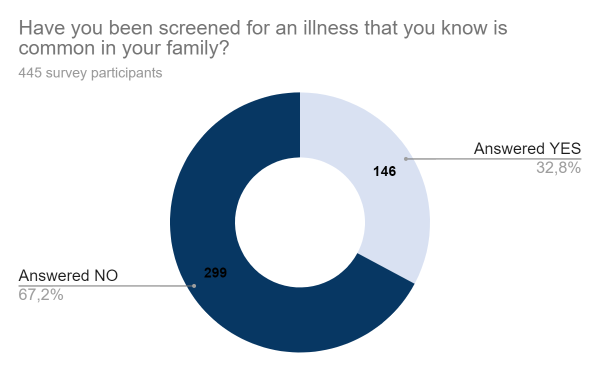
Some conditions require proper genetic screening: sickle cell disease, cystic fibrosis or haemophilia for example are genetic diseases, the transmission of which depends on the presence of a specific gene in the offspring. It is then possible to determine the chances of the offspring being carriers of the gene in question and developing the disease. These specific illnesses form part of a family's health history, but their transmission is essentially conditioned by genetic transmission.
What are the barriers to compiling a family health history?
There are a number of obstacles to the way in which family medical information is collected.
In the framework of our survey, one question was dedicated to the obstacles of a possible screening. We can see that a majority of respondents said they did not know that an illness existed in their family.
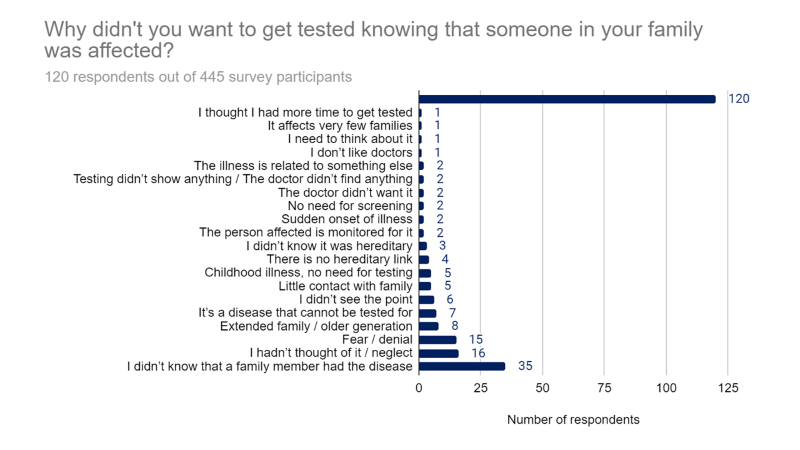
Indeed, the process involves medical information, the sharing of which is a sensitive issue. It is important to remember that a patient's health data belongs first and foremost to the patient. Doctors and other health professionals are subject to medical confidentiality and can only suggest and try to convince a patient to communicate his or her diagnosis to his or her relatives.
It should be remembered that family health history is not entirely genetic and is based on a shared lifestyle, environment or exposure. Nevertheless, this is essential information to communicate to one's medical team.
Was this article helpful to you?
Share your thoughts and questions in the comments below!
Take care!
Sources:
"Why is it important to know my family medical history ?" - Medlineplus.gov
"Family Health History: Why It’s Important and What You Should Know" - Healthline
Cardiovascular Disease - NHS
Diabetes Risk Factors, Diabetes UK
"Family Health History: The Basics" - Centers for Disease Control and Prevention

 Facebook
Facebook Twitter
Twitter





